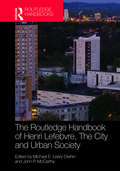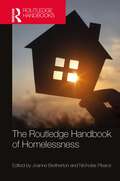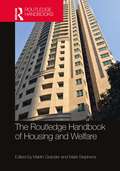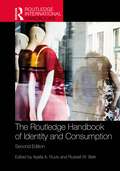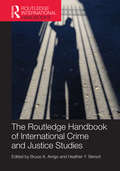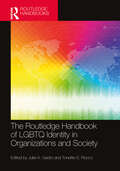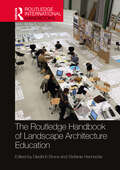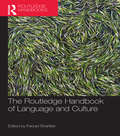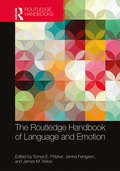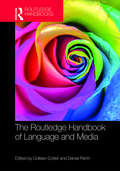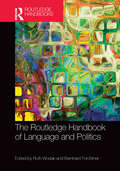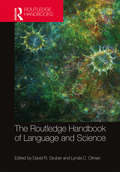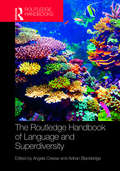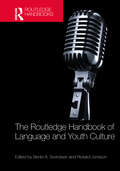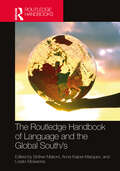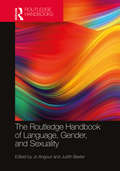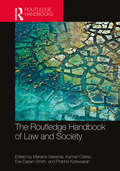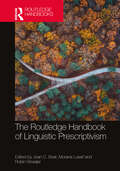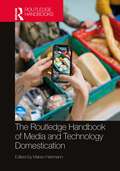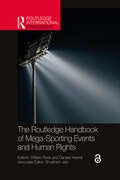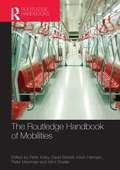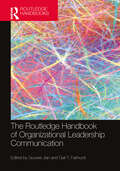- Table View
- List View
The Routledge Handbook of Henri Lefebvre, The City and Urban Society
by Michael E. Leary-Owhin John P. McCarthyThe Routledge Handbook of Henri Lefebvre,The City and Urban Society is the first edited book to focus on Lefebvre's urban theories and ideas from a global perspective, making use of recent theoretical and empirical developments, with contributions from eminent as well as emergent global scholars. The book provides international comparison of Lefebvrian research and theoretical conjecture and aims; to engage with and critique Lefebvre's ideas in the context of contemporary urban, social and environmental upheavals; to use Lefebvre's spatial triad as a research tool as well as a point of departure for the adoption of ideas such as differential space; to reassess Lefebvre's ideas in relation to nature and global environmental sustainability; and to highlight how a Lefebvrian approach might assist in mobilising resistance to the excesses of globalised neoliberal urbanism. The volume draws inspiration from Lefebvre's key texts (The Production of Space; Critique of Everyday Life; and The Urban Revolution) and includes a comprehensive introduction and concluding chapter by the editors. The conclusions highlight implications in relation to increasing spatial inequalities; increasing diversity of needs including those of migrants; more authoritarian approaches; and asymmetries of access to urban space. Above all, the book illustrates the continuing relevance of Levebvre's ideas for contemporary urban issues and shows – via global case studies – how resistance to spatial domination by powerful interests might be achieved. The Handbook helps the reader navigate the complex terrain of spatial research inspired by Lefebvre. In particular the Handbook focuses on: the series of struggles globally for the 'right to the city' and the collision of debates around the urban age, 'cityism' and planetary urbanisation. It will be a guide for graduate and advanced undergraduate teaching, and a key reference for academics in the fields of Human Geography, Sociology, Political Science, Applied Philosophy, Planning, Urban Theory and Urban Studies. Practitioners and activists in the field will also find the book of relevance.
The Routledge Handbook of Homelessness
by Joanne Bretherton Nicholas PleaceThe Routledge Handbook of Homelessness brings together many of the world’s leading scholars in the field to provide a cutting-edge overview of classic and current research and future trends in the subject. Comprising 41 chapters and divided into four sections, the handbook includes A comprehensive introduction to homelessness, referring to history, culture, causation and definitions. Contemporary and historical debates around homelessness in different academic disciplines. Homelessness relating to gender, sexuality, youth, families, migration, rurality, veterans and health. A range of country-specific studies to illustrate the ways in which homelessness is researched and understood around the world. Methods of engagement and modes of analysis. With contributors from around the world and editors from the Centre of Housing Policy at the University of York, this handbook provides a groundbreaking and authoritative guide to theory, method and the primary interdisciplinary debates of today on homelessness. It will be essential reading for students, academics and professionals across the disciplines of sociology, human geography, public policy, housing policy, social policy, social work, economics and criminology.
The Routledge Handbook of Housing and Welfare
by Mark Stephens Martin GranderThis handbook takes on one of the most pressing issues of today’s society – the question of housing. It is a cutting-edge edited volume about the disputed interrelationship between housing and the wider welfare state. Although housing scholars generally agree that housing should be regarded as part of such a wider welfare system, it has proven hard to pinpoint and operationalize its position within it. Moreover, the relationship became considerably more complex as a result of the period of intense globalization and the integration of national housing finance systems into world finance markets. Furthermore, welfare systems reflect economic as well as social models and these, too, have changed as countries have responded to globalization, and traditional ideological frameworks have become less distinct. Thus, there is a need to redefine the connection between housing and welfare in light of changes in both welfare and housing systems. By investigating the current situation and historical development of housing provision and welfare distribution in different contexts worldwide, this book aims to contribute to an expanded understanding of housing and welfare. The book brings together 25 international housing researchers covering 15 countries worldwide. With such a global approach, the book aims to provide an updated empirical picture and analysis of different housing systems and their connection to the welfare regime in different national contexts. The book moves beyond the usual focus on affordable housing provision in the context of well-developed welfare regimes and includes countries from the global south, incorporating regions where it is debatable whether there are welfare systems present at all. Thus, the book aims to provide the reader with an insight into the large differences in housing provision in international contexts with large differences regarding how the welfare state is comprised. From these insights, we reflect on whether regime approaches continue to provide a suitable theoretical framework for understanding the relationship between housing and the wider welfare state. This handbook is essential reading for researchers, students, policymakers, and other professionals in the fields of housing studies, welfare studies, economics, urban studies, social work, social and public policy, and sociology.
The Routledge Handbook of Identity and Consumption (Routledge International Handbooks)
by Russell W. Belk Ayalla A. Ruvio"Tell me what you eat, I'll tell you who you are," said Anthelme Brillat-Savarin. Today, "You are what you consume" is more apt. Barbara Krueger’s ironic twist of Descartes – "I shop therefore I am" – has lost its irony. Such phrases have become commonplace descriptions of our identity in the contemporary world. In our materialistic world, it seems as if there is no debate that our consumption behavior is fused with our self-identity – shaping it, changing it, and often challenging it.The Routledge Handbook of Identity and Consumption introduces the reader to state-of-the-art research, written by the world’s leading scholars regarding the interplay between identity and consumption. The book addresses the diverse issues regarding the ways identity affects our consumption behaviour and vice-versa and in doing so presents a broad perspective on the dynamics of self-identity and consumption.With chapters discussing the theory, research, and practical implications of these dynamics, including the way they change across our life span and their expression within different social, cultural, and religious contexts, this book will be a valuable reference source for students and academics from a variety of disciplines.
The Routledge Handbook of International Crime and Justice Studies (Routledge International Handbooks)
by Bruce A. Arrigo Heather Y. BersotThe Routledge Handbook of International Crime and Justice Studies presents the enduring debates and emerging challenges in crime and justice studies from an international and multi-disciplinary perspective. Guided by the pivotal, although vastly under-examined, role that consumerism, politics, technology, and culture assume in shaping these debates and in organizing these challenges, individual chapters probe the global landscape of crime and justice with astonishing clarity and remarkable depth. A distinguished collection of experts examine the interdisciplinary field of international crime and justice. Their contributions are divided into thematic sections, including: theory, culture, and society industries of crime and justice: systems of policing, law, corrections and punishment the criminal enterprise global technologies media, crime, and culture green criminology political violence public health criminology the political economy of crime and justice. All the chapters include full pedagogy and instructional resources for easy referencing or classroom use. This Handbook will be useful for students, scholars and practitioners of law, medicine, history, economics, sociology, politics, philosophy, education, public health, and social policy.
The Routledge Handbook of LGBTQ Identity in Organizations and Society (Routledge International Handbooks)
by Tonette S. Rocco Julie A. GedroSexuality, gender, gender identity, and gender expression are fluid constructs, and the ways in which identity development intersects with organizations and exists in society are complex. The book is comprised of a range of multi-disciplinary and globally inspired perspectives representing leading-edge scholarship by authors from over a dozen countries on a range of issues and contexts regarding LGBTQ identity and experience. It is intended for a wide readership: those who are in LGBTQ-related academic fields; those who want to broaden their coursework by offering supplemental readings that center the perspectives of LGBTQ identities; and those who want to acquire knowledge and education on the subject of LGBTQ identity. There are 36 chapters written by scholars in fields such as social work, law, queer studies, business, human resource management and development, entrepreneurship, criminal justice, economics, marketing, religion, architecture, sport, theater, psychology, human ecology, and adult education. The chapters can be read in sequence, and the book can also be used as a reference work for which educators, practitioners, and non-academics can identify and select particular chapters that inform areas of inquiry.
The Routledge Handbook of Landscape Architecture Education (Routledge International Handbooks)
by Diedrich Bruns Stefanie HenneckeIn this handbook, 60 authors, senior and junior educators, and researchers from six continents provide an overview of 200 years of landscape architectural education. They tell the stories of schools and people, of visions, and of experiments that constitute landscape architecture education heritage. Through taking an international perspective, the handbook centers inclusivity with an appreciation for how education develops in different political and societal contexts. Part I introduces the field of education history research, including research approaches and international research exchange. Spanning more than 100 years, Parts II and III investigate and compare early and recent histories of landscape architecture education in different countries and schools. In Part IV, the book offers new perspectives for landscape architecture education. Education research presents a substantial opportunity for challenging studies to increase the pedagogic and didactic, the academic and historic, and the disciplinary knowledge basis. Through a boundary-crossing approach, these studies about landscape architecture education provide a reference to teachers and students, policymakers, and administrators, who strive for innovative, holistic, and interdisciplinary practice.
The Routledge Handbook of Landscape Architecture Education (Routledge International Handbooks)
by Diedrich Bruns Stefanie HenneckeIn this handbook, 60 authors, senior and junior educators, and researchers from six continents provide an overview of 200 years of landscape architectural education. They tell the stories of schools and people, of visions, and of experiments that constitute landscape architecture education heritage. Through taking an international perspective, the handbook centers inclusivity with an appreciation for how education develops in different political and societal contexts. Part I introduces the field of education history research, including research approaches and international research exchange. Spanning more than 100 years, Parts II and III investigate and compare early and recent histories of landscape architecture education in different countries and schools. In Part IV, the book offers new perspectives for landscape architecture education. Education research presents a substantial opportunity for challenging studies to increase the pedagogic and didactic, the academic and historic, and the disciplinary knowledge basis.Through a boundary-crossing approach, these studies about landscape architecture education provide a reference to teachers and students, policymakers, and administrators, who strive for innovative, holistic, and interdisciplinary practice.
The Routledge Handbook of Language and Culture (Routledge Handbooks in Linguistics)
by Farzad SharifianThe Routledge Handbook of Language and Culture presents the first comprehensive survey of research on the relationship between language and culture. It provides readers with a clear and accessible introduction to both interdisciplinary and multidisciplinary studies of language and culture, and addresses key issues of language and culturally based linguistic research from a variety of perspectives and theoretical frameworks. This Handbook features thirty-three newly commissioned chapters which cover key areas such as cognitive psychology, cognitive linguistics, cognitive anthropology, linguistic anthropology, cultural anthropology, and sociolinguistics offer insights into the historical development, contemporary theory, research, and practice of each topic, and explore the potential future directions of the field show readers how language and culture research can be of practical benefit to applied areas of research and practice, such as intercultural communication and second language teaching and learning. Written by a group of prominent scholars from around the globe, The Routledge Handbook of Language and Culture provides a vital resource for scholars and students working in this area.
The Routledge Handbook of Language and Emotion (Routledge Handbooks in Linguistics)
by Sonya E. Pritzker Janina Fenigsen James M. WilceThe Routledge Handbook of Language and Emotion offers a variety of critical theoretical and methodological perspectives that interrogate the ways in which ideas about and experiences of emotion are shaped by linguistic encounters, and vice versa. Taking an interdisciplinary approach which incorporates disciplines such as linguistic anthropology, sociolinguistics, applied linguistics, psychology, communication studies, education, sociology, folklore, religious studies, and literature, this book: explores and illustrates the relationship between language and emotion in the five key areas of language socialisation; culture, translation and transformation; poetry, pragmatics and power; the affective body-self; and emotion communities; situates our present-day thinking about language and emotion by providing a historical and cultural overview of distinctions and moral values that have traditionally dominated Western thought relating to emotions and their management; provides a unique insight into the multiple ways in which language incites emotion, and vice versa, especially in the context of culture. With contributions from an international range of leading and emerging scholars in their fields, The Routledge Handbook of Language and Emotion is an indispensable resource for students and researchers who are interested in incorporating interdisciplinary perspectives on language and emotion into their work.
The Routledge Handbook of Language and Media
by Colleen Cotter Daniel PerrinThe Routledge Handbook of Language and Media provides an accessible and comprehensive overview of state-of-the-art research in media linguistics. This handbook analyzes both language theory and practice, demonstrating the vital role of this research in understanding language use in society. With over thirty chapters contributed by leading academics from around the world, this handbook: addresses issues of language use, form, structure, ideology, practice, and culture in the context of both traditional and new communication media; investigates mediated language use in public spheres, organizations, and personal communication, including newspaper journalism, broadcasting, and social media; examines the interplay of language and media from both linguistic and media perspectives, discussing auditory and visual media and graphic modes, as well as language and gender, multilingualism, and language change; analyzes the advantages and shortcomings of current approaches within media linguistics research and outlines avenues for future research. The Routledge Handbook of Language and Media is a must-have survey of this key field, and is essential reading for those interested in media linguistics.
The Routledge Handbook of Language and Politics (Routledge Handbooks in Linguistics)
by Ruth Wodak and Bernhard ForchtnerThe Routledge Handbook of Language and Politics provides a comprehensive overview of this important and dynamic area of study and research. Language is indispensable to initiating, justifying, legitimatising and coordinating action as well as negotiating conflict and, as such, is intrinsically linked to the area of politics. With 45 chapters written by leading scholars from around the world, this Handbook covers the following key areas: Overviews of the most influential theoretical approaches, including Bourdieu, Foucault, Habermas and Marx; Methodological approaches to language and politics, covering – among others – content analysis, conversation analysis, multimodal analysis and narrative analysis; Genres of political action from speech-making and policy to national anthems and billboards; Cutting-edge case studies about hot-topic socio-political phenomena, such as ageing, social class, gendered politics and populism. The Routledge Handbook of Language and Politics is a vibrant survey of this key field and is essential reading for advanced students and researchers studying language and politics.
The Routledge Handbook of Language and Science (Routledge Handbooks in Linguistics)
by Lynda C. Olman David R. GruberThe Routledge Handbook of Language and Science provides a state-of-the-art volume on the language of scientific processes and communications. This book offers comprehensive coverage of socio-cultural approaches to science, as well as analysing new theoretical developments and incorporating discussions about future directions within the field. Featuring original contributions from an international range of renowned scholars, as well as academics at the forefront of innovative research, this handbook: identifies common objects of inquiry across the areas of rhetoric, sociolinguistics, communication studies, science and technology studies, and public understanding of science covers the four key themes of power, pedagogy, public engagement, and materiality in relation to the study of scientific language and its development uses qualitative and quantitative approaches to demonstrate how humanities and social science scholars can go about studying science details the meaning and purpose of socio-cultural approaches to science, including the impact of new media technologies analyses the history of the field and how it positions itself in relation to other areas of study Ushering the study of language and science toward a more interdisciplinary, diverse, communal and ecological future, The Routledge Handbook of Language and Science is an essential reference for anyone with an interest in this area.
The Routledge Handbook of Language and Science (Routledge Handbooks in Linguistics)
by R. Gruber Lynda C. OlmanThe Routledge Handbook of Language and Science provides a state-of-the-art volume on the language of scientific processes and communications. This book offers comprehensive coverage of socio-cultural approaches to science, as well as analysing new theoretical developments and incorporating discussions about future directions within the field. Featuring original contributions from an international range of renowned scholars, as well as academics at the forefront of innovative research, this handbook: identifies common objects of inquiry across the areas of rhetoric, sociolinguistics, communication studies, science and technology studies, and public understanding of science; covers the four key themes of power, pedagogy, public engagement, and materiality in relation to the study of scientific language and its development; uses qualitative and quantitative approaches to demonstrate how humanities and social science scholars can go about studying science; details the meaning and purpose of socio-cultural approaches to science, including the impact of new media technologies; analyses the history of the field and how it positions itself in relation to other areas of study. Ushering the study of language and science toward a more interdisciplinary, diverse, communal and ecological future, The Routledge Handbook of Language and Science is an essential reference for anyone with an interest in this area.
The Routledge Handbook of Language and Superdiversity (Routledge Handbooks in Applied Linguistics)
by Angela Creese Adrian BlackledgeThe Routledge Handbook of Language and Superdiversity provides an accessible and authoritative overview of this growing area, the linguistic analysis of interaction in superdiverse cities. Developed as a descriptive term to account for the increasingly stratified processes and effects of migration in Western Europe, ‘superdiversity’ has the potential to contribute to an enhanced understanding of mobility, complexity, and change, with theoretical, practical, global, and methodological reach. With seven sections edited by leading names, the handbook includes 35 state-of-the art chapters from international authorities. The handbook adopts a truly interdisciplinary approach, covering: Cultural heritage Sport Law Education Business and entrepreneurship. The result is a truly comprehensive account of how people live, work and communicate in superdiverse spaces. This volume is key reading for all those engaged in the study and research of Language and Superdiversity within Applied Linguistics, Linguistic Anthropology and related areas.
The Routledge Handbook of Language and Youth Culture (Routledge Handbooks in Applied Linguistics)
by Bente A. Svendsen and Rickard JonssonThe Routledge Handbook of Language and Youth Culture offers the first essential grounding of critical youth studies within sociolinguistic research. Young people are often seen to be at the frontline of linguistic creativity and pioneering communicative technologies. Their linguistic practices are considered a primary means of exploring linguistic change as well as the role of language in social life, such as how language and identity, ideology and power intersect. Bringing together leading and cutting-edge perspectives from thought leaders across the globe, this handbook: • addresses how young people’s cultural practices, as well as forces like class, gender, ethnicity and race, influence language • considers emotions, affect, age and ageism, materiality, embodiment and the political youth, as well as processes of unmooring language and place • critically reflects on our understandings of terms such as ‘language’, ‘youth’ and ‘culture’, drawing on insights from youth studies to help contextualise age within power dynamics • features examples from a wide range of linguistic contexts such as social media and the classroom, as well as expressions such as graffiti, gestures and different musical genres including grime and hip-hop. Providing important insights into how young people think, feel, act, and communicate in the complexity of a polarised world, The Routledge Handbook of Language and Youth Culture is an invaluable resource for advanced students and researchers in disciplines including sociolinguistics, linguistic anthropology, multilingualism, youth studies and sociology.
The Routledge Handbook of Language and the Global South/s (Routledge Handbooks in Applied Linguistics)
by Sinfree Makoni Anna Kaiper-Marquez Lorato MokwenaThis Handbook centers on language(s) in the Global South/s and the many ways in which both "language" and the "Global South" are conceptualized, theorized, practiced, and reshaped. Drawing on 31 chapters situated in diverse geographical contexts, and four additional interviews with leading scholars, this text showcases: Issues of decolonization Promotion of Southern epistemologies and theories of the Global South/s A focus on social/applied linguistics An added focus on the academy A nuanced understanding of global language scholarship. It is written for emerging and established scholars across the globe as it positions Southern epistemologies, language scholarship, and decolonial theories into scholarship surrounding multiple themes and global perspectives.
The Routledge Handbook of Language, Gender, and Sexuality (Routledge Handbooks in Applied Linguistics)
by Jo Angouri and Judith BaxterThe Routledge Handbook of Language, Gender, and Sexuality provides an accessible and authoritative overview of this dynamic and growing area of research. Covering cutting-edge debates in eight parts, it is designed as a series of mini edited collections, enabling the reader, and particularly the novice reader, to discover new ways of approaching language, gender, and sexuality. With a distinctive focus both on methodologies and theoretical frameworks, the Handbook includes 40 state-of-the art chapters from international authorities. Each chapter provides a concise and critical discussion of a methodological approach, an empirical study to model the approach, a discussion of real-world applications, and further reading. Each section also contains a chapter by leading scholars in that area, positioning, through their own work and chapters in their part, current state-of-the-art and future directions. This volume is key reading for all engaged in the study and research of language, gender, and sexuality within English language, sociolinguistics, discourse studies, applied linguistics, and gender studies.
The Routledge Handbook of Law and Society
by Mariana Valverde Prabha Kotiswaran Eve Darian-Smith Kamari ClarkeThis innovative handbook provides a comprehensive, and truly global, overview of the main approaches and themes within law and society scholarship or social-legal studies. A one-volume introduction to academic resources and ideas that are relevant for today’s debates on issues from reproductive justice to climate justice, food security, water conflicts, artificial intelligence, and global financial transactions, this handbook is divided into two sections. The first, ‘Perspectives and Approaches’, accessibly explains a variety of frameworks through which the relationship between law and society is addressed and understood, with emphasis on contemporary perspectives that are relatively new to many socio-legal scholars. Following the book’s overall interest in social justice, the entries in this section of the book show how conceptual tools originate in, and help to illuminate, real-world issues. The second and largest section of the book (42 short well-written pieces) presents reflections on topics or areas concerning law, justice, and society that are inherently interdisciplinary and that are relevance to current – but also classical – struggles around justice. Informing readers about the lineage of ideas that are used or could be used today for research and activism, the book attends to the full range of local, national and transnational issues in law and society. The authors were carefully chosen to achieve a diverse and non-Eurocentric view of socio-legal studies. This volume will be invaluable for law students, those in inter-disciplinary programs such as law and society, justice studies and legal studies, and those with interests in law, but based in other social sciences. It will also appeal to general readers interested in questions of justice and rights, including activists and advocates around the world.
The Routledge Handbook of Linguistic Prescriptivism (Routledge Handbooks in Linguistics)
by Joan C. Beal Morana Lukač Robin StraaijerThis Handbook provides a comprehensive and cutting-edge overview of the field of linguistic prescriptivism. Mapping the current status quo of the field and marking its two-decade transformation into a serious field of study within linguistics, this volume addresses both the value and the methods of studying prescriptivism. It covers: • Theoretical and methodological approaches – from historical to experimental approaches and including corpus-based methods and attitudes research; • Contexts in which prescriptive efforts can be both observed and studied – including education, technology, the media, language planning and policies, and everyday grassroots practices; • Geographical contexts of prescriptivism – featuring chapters on inner- and outer-circle Englishes, English as a Lingua Franca, as well as prescriptivism in the context of other world languages including minority and endangered languages. With contributions from an international line-up of leading and rising-star scholars in the field, The Routledge Handbook of Linguistic Prescriptivism marks the evolution of linguistics as a fully self- aware discipline and will be an indispensable guide for students and researchers in this area.
The Routledge Handbook of Media and Technology Domestication
by Maren HartmannThis Handbook offers a comprehensive overview of media domestication – the process of appropriating new media and technology – and delves into the theoretical, conceptual and social implications of the field’s advancement. Combining the work of the long-established experts in the field with that of emerging scholars, the chapters explore both the domestication concept itself and domestication processes in a wide range of fields, from smartphones used to monitor drug use to the question of time in the domestication of energy buildings. The international team of authors provide an accessible and thorough assessment of key issues, themes and problems with and within domestication research, and showcase the most important developments over the years. This truly interdisciplinary collection will be an important resource for advanced undergraduates, postgraduates and academic scholars in media, communication and cultural studies, sociology, anthropology, cultural geography, design studies and social studies of technology. Chapter 3 of this book is freely available as a downloadable Open Access PDF at http://www.taylorfrancis.com under a Creative Commons [Attribution-Non Commercial-No Derivatives (CC-BY-NC-ND)] 4.0 license.
The Routledge Handbook of Mega-Sporting Events and Human Rights (Routledge International Handbooks)
by William Rook Daniela Heerdt Shubham JainThe Routledge Handbook of Mega-Sporting Events and Human Rights is the first book to explore in depth the topic of mega-sporting events (MSEs) and human rights, offering accounts of adverse human rights impacts linked to MSEs while considering the potential for promoting human rights in and through the framework of these events. Drawing on the contributions of an international group of leading researchers, practitioners and advocates, the book introduces key concepts in human rights and considers how they relate to ethical, social, managerial and governance issues in contemporary MSEs, from inclusion and welfare to corruption and sustainability. It examines the role of key stakeholders in the delivery of MSEs, including organising committees, sport governing bodies, governments, athletes, sponsors and broadcasters, as well as the role of activists and advocates, and presents historical and contemporary case studies of human rights as an active issue in MSEs. The book provides new perspectives on human rights as a lens for understanding modern sport and as a guiding principle for responsible sport that protects the interests of individuals and communities, as well as offering guidance on best practice. It is essential reading for all advanced students, researchers, practitioners, policymakers and stakeholders with an interest in organisation and delivery of MSEs, as well as general sport management, sport policy, sport governance, the ethics of sport, event management, political science, development studies, ethical business or the significance of sport in wider society.
The Routledge Handbook of Mega-Sporting Events and Human Rights (Routledge International Handbooks)
by William Rook Daniela Heerdt Shubham JainThe Routledge Handbook of Mega-Sporting Events and Human Rights is the first book to explore in depth the topic of mega-sporting events (MSEs) and human rights, offering accounts of adverse human rights impacts linked to MSEs while considering the potential for promoting human rights in and through the framework of these events.Drawing on the contributions of an international group of leading researchers, practitioners and advocates, the book introduces key concepts in human rights and considers how they relate to ethical, social, managerial and governance issues in contemporary MSEs, from inclusion and welfare to corruption and sustainability. It examines the role of key stakeholders in the delivery of MSEs, including organising committees, sport governing bodies, governments, athletes, sponsors and broadcasters, as well as the role of activists and advocates, and presents historical and contemporary case studies of human rights as an active issue in MSEs. The book provides new perspectives on human rights as a lens for understanding modern sport and as a guiding principle for responsible sport that protects the interests of individuals and communities, as well as offering guidance on best practice.It is essential reading for all advanced students, researchers, practitioners, policymakers and stakeholders with an interest in organisation and delivery of MSEs, as well as general sport management, sport policy, sport governance, the ethics of sport, event management, political science, development studies, ethical business or the significance of sport in wider society.
The Routledge Handbook of Mobilities
by Kevin Hannam Mimi Sheller Peter Merriman Peter Adey David BissellThe 21st century seems to be on the move, perhaps even more so than the last. With cheap travel, and more than two billion cars projected worldwide for 2030. And yet, all this mobility is happening incredibly unevenly, at different paces and intensities, with varying impacts and consequences to the extent that life on the move might be actually quite difficult to sustain environmentally, socially and ethically. As a result 'mobility' has become a keyword of the social sciences; delineating a new domain of concepts, approaches, methodologies and techniques which seek to understand the character and quality of these trends. This Handbook explores and critically evaluates the debates, approaches, controversies and methodologies, inherent to this rapidly expanding discipline. It brings together leading specialists from range of backgrounds and geographical regions to provide an authoritative and comprehensive overview of this field, conveying cutting edge research in an accessible way whilst giving detailed grounding in the evolution of past debates on mobilities. It illustrates disciplinary trends and pathways, from migration studies and transport history to communications research, featuring methodological innovations and developments and conceptual histories - from feminist theory to tourist studies. It explores the dominant figures of mobility, from children to soldiers and the mobility impaired; the disparate materialities of mobility such as flows of water and waste to the vectors of viruses; key infrastructures such as logistics systems to the informal services of megacity slums, and the important mobility events around which our world turns; from going on vacation to the commute, to the catastrophic disruption of mobility systems. The text is forward-thinking, projecting the future of mobilities as they might be lived, transformed and studied, and possibly, brought to an end. International in focus, the book transcends disciplinary and national boundaries to explore mobilities as they are understood from different perspectives, different fields, countries and standpoints. This is an invaluable resource for all those with an interest in mobility across disciplinary boundaries and areas of study.
The Routledge Handbook of Organizational Leadership Communication (Routledge Handbooks in Communication Studies)
by Gail T. Fairhurst Guowei JianThis handbook captures a rapidly developing body of scholarship to map out the terrain of leadership communication and stimulate interdisciplinary dialogue among leadership communication scholars for future research. The Routledge Handbook of Organizational Leadership Communication surveys various areas of leadership communication, critically assesses their development, and proposes guidance for future research. It begins by addressing prominent theories or emerging theoretical perspectives that help conceptualize leadership communication, ranging from collective leadership approaches and critical perspectives to theories of practice and communicative constitution of organization. The second section focuses on reviewing the latest research on leadership communication in various organizational contexts, such as work teams, hybrid and virtual work contexts, and interorganizational collaboration. Informed by diverse theoretical perspectives, chapters in the final section examine the practice of leadership communication in dealing with both common and novel organizing challenges and processes, for example, the formation and execution of organizational vision and strategies, the use of emerging media technologies, and organizational decision making.The handbook will be an indispensable resource for researchers and advanced students in leadership communication and leadership studies and practicing managers and consultants in leadership and communication training and development.
